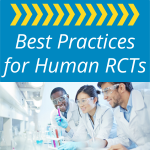
Designing and Conducting Human Nutrition RCTs (Best Practices for Human RCTs Collection)
Human nutrition randomized controlled trials (RCTs) have unique considerations and conducting them with the highest scientific rigor is essential to the development of evidence-based dietary guidance for promoting optimal health and advancing health care. Diet-related interventions can include diet and/or behavioral manipulation, provision of foods or entire meals, or delivery of dietary components in individual food items or supplements.
Join an esteemed faculty for a training on the design and conduct of human nutrition RCTs, documentation and reporting of all aspects of clinical trial management, and data analysis and reporting of results. Course content is based on a series of articles published in Advances in Nutrition; see reading assignments below.
Reading Assignments as Preparation for Course Attendance
This course is included in the Best Practices for Human RCTs Collection.
Learning Objectives
- Use core principles to design and conduct controlled feeding studies
- Prepare documentation and reporting requirements for clinical trial management
Target Audience
- Faculty in graduate nutrition/obesity and related programs
- NIH-funded Nutrition Obesity Research Center members
- Graduate students and early career professionals
- Contract research organizations staff
- International nutrition societies members
- Industry scientists
- Funding agencies personnel
- Clinical research oversight committee members and auditors
This activity includes the following presentations:
Designing and Conducting Human Nutrition RCTs
Welcome and Introductions
Martha A. Belury, PhD, RDN – The Ohio State University
Connie M. Weaver, PhD – San Diego State University
Session 1: Designing and Conducting Human Nutrition RCTs
Cheryl Anderson, MPH, PhD – University of California, San Diego
Design and Conduct of a Randomized, Crossover, Controlled Feeding Study: Example from the Soy vs Animal Protein Study +/- Soy Derived Isoflavones
Alice H. Lichtenstein, DSc – Jean Mayer USDA HNRCA at Tufts University
Design and Conduct of a Randomized, Crossover, Controlled Feeding Study: Example from the Carbohydrates and Related Biomarkers (CARB) Study
Johanna W. Lampe, PhD – Fred Hutchinson Cancer Research Center
Translation of Findings from the DASH Feeding Study: Design and Conduct of PREMIER, a Behavioral Intervention Trial
Lawrence J. Appel, MD, MPH – Johns Hopkins University School of Medicine, Johns Hopkins Bloomberg School of Public Health, and The Welch Center for Prevention, Epidemiology and Clinical Research
Session 1 Panel Discussion
Lawrence J. Appel, MD, MPH – Johns Hopkins University School of Medicine, Johns Hopkins Bloomberg School of Public Health, and The Welch Center for Prevention, Epidemiology and Clinical Research
Johanna W. Lampe, PhD – Fred Hutchinson Cancer Research Center
Alice H. Lichtenstein, DSc – Jean Mayer USDA HNRCA at Tufts University
Connie M. Weaver, PhD – San Diego State University
Session 2: Documentation and Regulation for Human Nutrition RCTs / Importance of Documentation
Connie M. Weaver, PhD – San Diego State University
Documentation of Dietary Interventions in a Controlled Feeding Study and a Tolerance Study
DeAnn Liska, PhD – Texas A&M AgriLife
Regulatory OVERSIGHT in Clinical Trials: WHI & WHIMS
Linda Snetselaar, PhD, RD – University of Iowa
Development of SOPs and Staff Training in Clinical Trials: OWLE
Sue A. Shapses, PhD – Rutgers University
Session 2 Panel Discussion
DeAnn Liska, PhD – Texas A&M AgriLife
Richard Mattes, MPH, PhD, R.D. – Purdue University
Sue A. Shapses, PhD – Rutgers University
Linda Snetselaar, PhD, RD – University of Iowa
Highlights
Cheryl Anderson, MPH, PhD – University of California, San Diego
Disclosure Policy
The American Society for Nutrition supports fair and unbiased participation of individuals in its education activities. Any real or potential conflicts of interest must be identified and managed. All relevant financial relationships with commercial interests that directly impact and/or might conflict with ASN activities must be disclosed, or disclosure that no relevant financial relationships exist must be documented. Other relationships that could cause private interests to conflict with professional interests must also be disclosed. This policy is intended to openly identify any potential conflict so that participants in an education activity are able to form their own judgments about the presentation. In addition, disclosure must be made of presentations on drugs or devices or uses of drugs or devices that have not been approved by the Food and Drug Administration.
Speakers
Designing and Conducting Human Nutrition RCTs
Cheryl Anderson, MPH, PhD, University of California, San Diego
No relevant financial relationship(s) with ineligible companies to disclose.
Lawrence Appel, MD, MPH, Johns Hopkins University School of Medicine, Johns Hopkins Bloomberg School of Public Health, and The Welch Center for Prevention, Epidemiology and Clinical Research
No relevant financial relationship(s) with ineligible companies to disclose.
Martha Belury, PhD, RDN, The Ohio State University
No relevant financial relationship(s) with ineligible companies to disclose.
Johanna Lampe, PhD, Fred Hutchinson Cancer Research Center
No relevant financial relationship(s) with ineligible companies to disclose.
Alice Lichtenstein, DSc, Jean Mayer USDA HNRCA at Tufts University
No relevant financial relationship(s) with ineligible companies to disclose.
DeAnn Liska, PhD, Texas A&M AgriLife
No relevant financial relationship(s) with ineligible companies to disclose.
Richard Mattes, MPH, PhD, R.D., Purdue University
Disclosures: Advisory Committee/Board Member: Grain Food Foundation, Mars Wrigley; Grant/Research Support: Almond Board of California
Sue Shapses, PhD, Rutgers University
No relevant financial relationship(s) with ineligible companies to disclose.
Linda Snetselaar, PhD, RD, University of Iowa
No relevant financial relationship(s) with ineligible companies to disclose.
Connie Weaver, PhD, San Diego State University
No relevant financial relationship(s) with ineligible companies to disclose.
Staff
Michelle Crispino, American Society for Nutrition
No relevant financial relationship(s) with ineligible companies to disclose.
Gwen Twillman, American Society for Nutrition
No relevant financial relationship(s) with ineligible companies to disclose.
Available Credit
- 3.00 Attendance
Learners are eligible to download a Certificate of Attendance upon activity completion. A Certificate of Attendance confirms the learner has completed the activity and does not confer any continuing education credit to the learner from ASN.
Price
This course is included in the Best Practices for Human RCTs Collection.

 Facebook
Facebook X
X LinkedIn
LinkedIn Forward
Forward